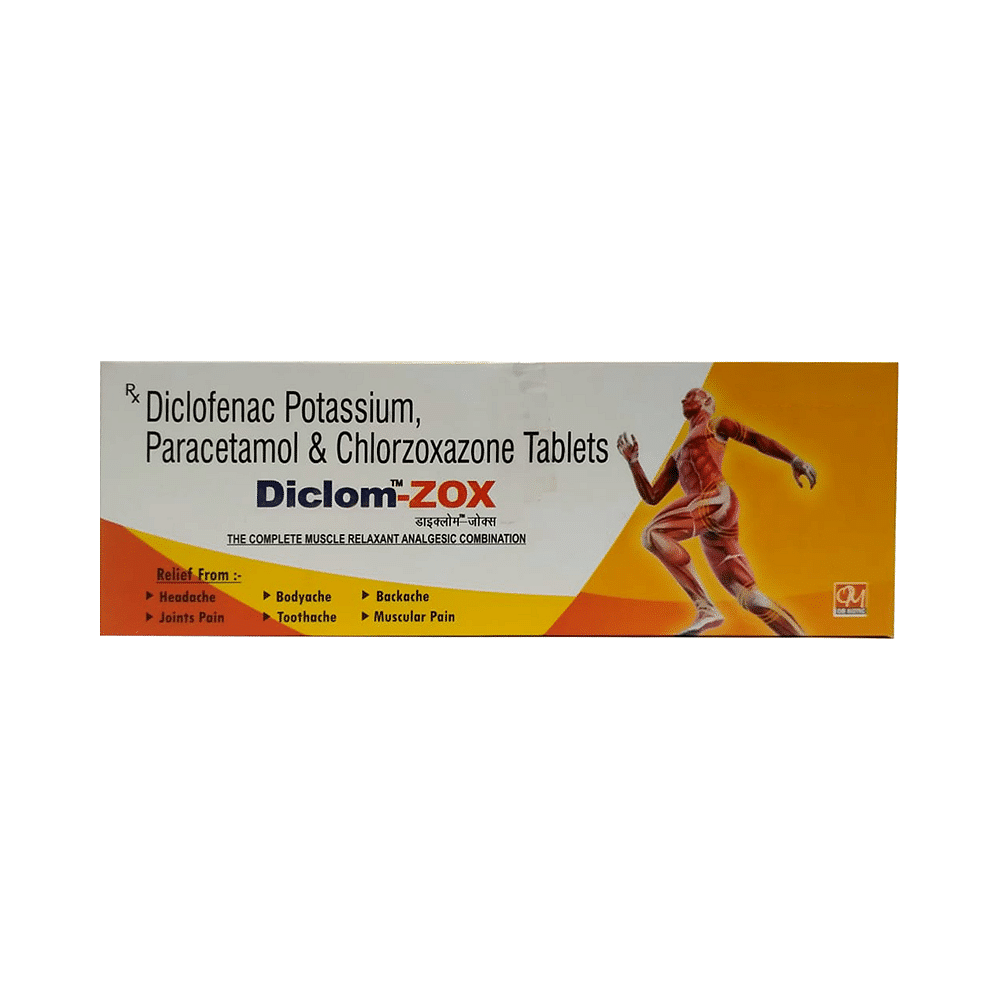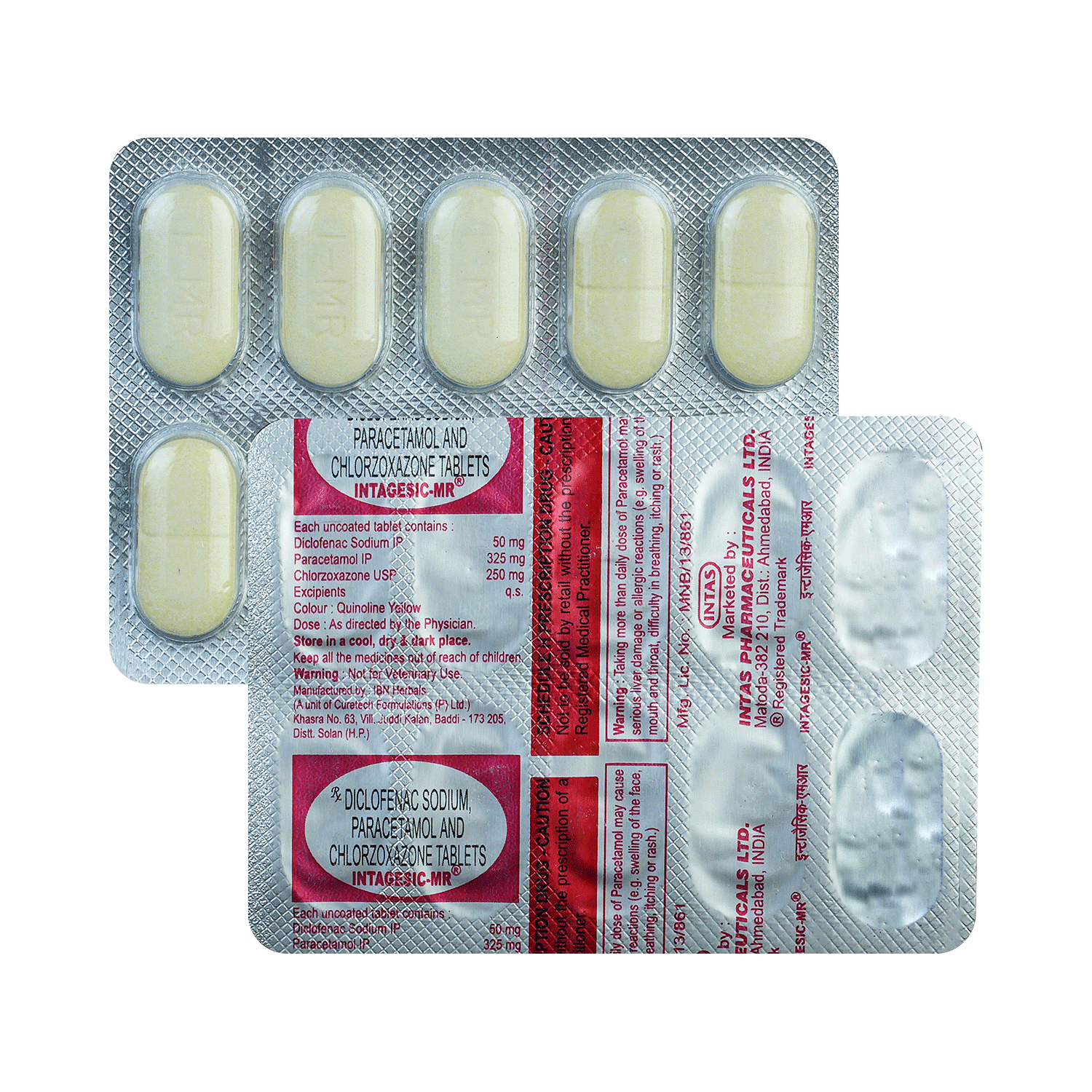
Defnac MR 250mg/50mg/325mg Tablet
Manufacturer
Lifecred Healthcare Pvt. Ltd.
Salt Composition
Chlorzoxazone (250mg) + Diclofenac (50mg) + Paracetamol (325mg)
Key Information
Short Description
Defnac MR 250mg/50mg/325mg Tablet is a combination medicine used in the treatment of pain due to muscle spasms. It improves the movement of muscles and provides relief from pain and discomfort associated with muscle spasms.
Dosage Form
Tablet
Introduction
Defnac MR 250mg/50mg/325mg Tablet should be taken with food. This will prevent you from getting an upset stomach. You should take it regularly as advised by your doctor. Do not take more or use it for a longer duration than recommended by your doctor. Using this medicine can cause some common side effects such as nausea, vomiting, heartburn, stomach pain, diarrhea, loss of appetite, and dryness in the mouth. If any of these side effects bother you or do not go away with time, you should let your doctor know. Your doctor may help with ways to reduce or prevent these side effects. The medicine may not be suitable for everybody. Before taking it, let your doctor know if you have any problems with your heart, kidneys, or liver. To make sure it is safe for you, let your doctor also know all the other medicines you are taking. Pregnant and breastfeeding mothers should first consult their doctors before using the medicine.
Directions for Use
Take this medicine in the dose and duration as advised by your doctor. Swallow it as a whole. Do not chew, crush or break it. Defnac MR 250mg/50mg/325mg Tablet is to be taken with food.
Safety Information
Side Effects
No common side effects listed.
Alcohol Warning
It is not known whether it is safe to consume alcohol with Defnac MR 250mg/50mg/325mg Tablet. Please consult your doctor.
Breastfeeding Warning
Information regarding the use of Defnac MR 250mg/50mg/325mg Tablet during breastfeeding is not available. Please consult your doctor.
Pregnancy Warning
Information regarding the use of Defnac MR 250mg/50mg/325mg Tablet during pregnancy is not available. Please consult your doctor.
Interacting Medicines
Do not take it with any other medicine containing acetaminophen (drugs for pain/fever or cough-and-cold) without asking your doctor first.
How it works
Defnac MR 250mg/50mg/325mg Tablet is a combination of a muscle relaxant (Chlorzoxazone) and two pain relieving medicines (Diclofenac and Paracetamol). The muscle relaxant works on the centers in the brain and spinal cord to relieve muscle stiffness or spasm, thereby improving movement of muscles. The pain relieving medicines work by blocking the release of certain chemical messengers in the brain that cause pain and inflammation (redness and swelling).
Quick Tips
You have been prescribed Defnac MR 250mg/50mg/325mg Tablet to relieve pain due to muscle spasm. This medicine is most effective when taken along with proper rest and physical therapy. Avoid consuming alcohol when taking Defnac MR 250mg/50mg/325mg Tablet as it may cause excessive drowsiness and increase the risk of liver damage. Older adults may have increased drowsiness, confusion, and higher risk of falling as a result of taking Defnac MR 250mg/50mg/325mg Tablet. Do not take it with any other medicine containing acetaminophen (drugs for pain/fever or cough-and-cold) without asking your doctor first.
Related Medicines

Diclomzox Tab

Wingesic MR Tablet

Intagesic-MR Tablet

Simdic MR 250mg/50mg/325mg Tablet

Diclolix MR 250mg/50mg/325mg Tablet

Daklofen MR 250mg/50mg/325mg Tablet

Neugesic MR Tablet

Dicobris MR 250mg/50mg/325mg Tablet

Diclopas-MR Tablet

Vatican's Trick-Dmr Tablet
Frequently asked questions
What is Defnac MR 250mg/50mg/325mg Tablet?
Defnac MR 250mg/50mg/325mg Tablet contains three medicines: diclofenac, paracetamol, and chlorzoxazone. This combination is used to relieve muscle pain. Chlorzoxazone is a muscle relaxant that works by affecting the central nervous system. Diclofenac and paracetamol work by reducing chemicals in the body (prostaglandins) that cause pain and inflammation.
Is it safe to use Defnac MR 250mg/50mg/325mg Tablet?
Defnac MR 250mg/50mg/325mg Tablet is generally safe for most patients. However, common side effects include nausea, vomiting, heartburn, stomach pain, diarrhea, loss of appetite, dryness in the mouth, weakness, sleepiness, and other rare side effects. If you experience persistent problems, consult your doctor immediately.
Can I stop taking Defnac MR 250mg/50mg/325mg Tablet when my pain is relieved?
Defnac MR 250mg/50mg/325mg Tablet should be continued as prescribed by your doctor. However, you can stop it if it's used for short-term pain relief.
Can the use of Defnac MR 250mg/50mg/325mg Tablet cause nausea and vomiting?
Yes, Defnac MR 250mg/50mg/325mg Tablet can cause nausea and vomiting. To reduce this effect, take it with milk, food or antacids. Avoid fatty or fried foods when using this medication. If you vomit, drink small amounts of water frequently to prevent dehydration. If the vomiting persists or you notice signs of dehydration (dark-colored urine, low urine frequency), consult your doctor before taking any other medications.
Can the use of Defnac MR 250mg/50mg/325mg Tablet cause dizziness?
Yes, some patients might experience dizziness while using Defnac MR 250mg/50mg/325mg Tablet. If you feel dizzy or lightheaded, rest for a while and resume when feeling better.
Can the use of Defnac MR 250mg/50mg/325mg Tablet cause damage to kidneys?
Long-term use of Defnac MR 250mg/50mg/325mg Tablet may lead to kidney damage. Normal kidneys produce prostaglandins that protect them from harm. The use of painkillers reduces these prostaglandin levels, increasing the risk of kidney damage over time. Patients with pre-existing kidney problems should avoid using this medication.
Can I take a higher than the recommended dose of this medicine?
Taking a higher than recommended dose of Defnac MR 250mg/50mg/325mg Tablet can increase side effect risks. If you experience increased pain or if your pain isn't relieved by the prescribed dosage, please consult your doctor to reassess your treatment.
What are the recommended storage conditions for Defnac MR 250mg/50mg/325mg Tablet?
Keep this medicine in its original container or packaging, tightly closed. Store it according to the instructions on the label or packaging. Never dispose of the medication without consulting your doctor or pharmacist.


